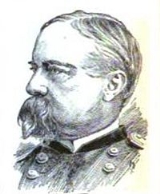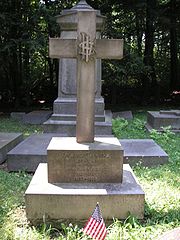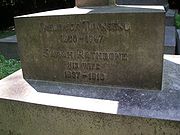
Frederick Townsend
Encyclopedia

American Civil War
The American Civil War was a civil war fought in the United States of America. In response to the election of Abraham Lincoln as President of the United States, 11 southern slave states declared their secession from the United States and formed the Confederate States of America ; the other 25...
. He founded and was Colonel of the 3rd New York Regiment, and later served with the US Army's 18th Infantry, where he was brevetted a brigadier general. Townsend served three terms as Adjutant General of the State of New York, from 1857–1861, and again in 1880.
Early life
Frederick Townsend was born in Albany, New YorkAlbany, New York
Albany is the capital city of the U.S. state of New York, the seat of Albany County, and the central city of New York's Capital District. Roughly north of New York City, Albany sits on the west bank of the Hudson River, about south of its confluence with the Mohawk River...
on 21 September 1825 to Isaiah and Hannah Townsend. He was the grandson of Solomon Townsend
Solomon Townsend
Solomon Townsend was a merchant ship’s captain prior to the American Revolution, owned an ironworks in New York State, and was a representative to the New York State Legislature. Stranded in London following the outbreak of hostilities, Townsend's passage back to America was facilitated by...
, a ship's captain during the American Revolution
American Revolution
The American Revolution was the political upheaval during the last half of the 18th century in which thirteen colonies in North America joined together to break free from the British Empire, combining to become the United States of America...
, and great grandson of Samuel Townsend a member of the New York provincial congress and of the committee appointed to prepare a form of government for the state of New York. His ancestors Henry Townsend
Henry Townsend (Oyster Bay)
Henry Townsend was the son of Henry Townsend, an early settler settler of the American Colonies, and a member of the Quaker religion.-Biography:...
and Henry's brother John
John Townsend (Norwich)
John Townsend was an early settler of the American Colonies who emigrated from England about 1630. Townsend was a signatory to the Flushing Remonstrance, a precursor to the United States Constitution's provision on freedom of religion in the Bill of Rights...
immigrated to Massachusetts from Norfolk England in 1640 and settled at Jamaica on Long Island NY, and were founding members of Oyster Bay Long Island.
Townsend had 7 brothers and 2 sisters. There was a strong military bent in the family, as one brother, Franklin Townsend
Franklin Townsend
Franklin Townsend was descended from Henry Townsend one of the founders of Oyster Bay, New York. He was a 19th century industrialist, active in his family's iron business which was a branch of the Stirling Iron Works, the maker of the Hudson River Chain that prevented the British Royal Navy from...
was Adjutant General of New York from 1869–1873, and another, Robert
Robert Townsend (Captain)
Captain Robert Townsend was a Civil War era ship Captain in the United States Navy. He served twice, once before the war then again during the war. He saw active combat while serving aboard three ships, most notably as commander of the USS Essex from 1863–1864, an ironclad gunship on the...
served in the U.S. Navy, both on the side of the Union. His sister Mary, on the other hand, married General William H.T. Walker of the Confederate Army.
Frederick attended a The Albany Academy
The Albany Academy
The Albany Academy is an independent college preparatory day school for boys in Albany, New York, USA, enrolling students from Preschool to Grade 12. It was established in 1813 by a charter signed by Mayor Philip Schuyler Van Rensselaer and the city council of Albany...
and Bartlett Collegiate School at Poughkeepsie, New York and was graduated from Union College
Union College
Union College is a private, non-denominational liberal arts college located in Schenectady, New York, United States. Founded in 1795, it was the first institution of higher learning chartered by the New York State Board of Regents. In the 19th century, it became the "Mother of Fraternities", as...
, which he entered at age 15, in 1844. He studied law under John Van S.L. Pruyn and was admitted to the bar in 1849 and practiced in Albany.
That year gold was discovered in California. Townsend was equipped by his grandmother with equipment and an aide to seek his fortune on the Pacific coast. After being given up for dead following a long period of no news, Frederick returned to Albany with tales of being captured by Indians and surviving a tornado. He also carried a single nugget of the precious metal which he gave his grandmother who preserved it as a family treasure.
Military career
Returning home he was made captain of company B of the Washington Continentals of Albany. He organized the 76th regiment of militia of which he was colonel, and later on the Albany Zouave cadets.He was appointed by Governor John Alsop King
John Alsop King
John Alsop King was an American politician who served as governor of New York.He was born in the area now encompassed by New York City on 3 January 1788 and was educated at Harrow School in England...
in 1857 Adjutant general
Adjutant general
An Adjutant General is a military chief administrative officer.-Imperial Russia:In Imperial Russia, the General-Adjutant was a Court officer, who was usually an army general. He served as a personal aide to the Tsar and hence was a member of the H. I. M. Retinue...
of the state of New York, leading Townsend to end his law practice. Finding the militia to be less than it should be, he significantly reordered it. He prepared an annual report to the legislature from this department for the first time. Additionally he improved the conditions of the citizen soldiers and increased their numbers to 12,000 effective men. Townsend's efforts were recognized as effective and he was reappointed by the next governor of the state, Governor Edwin D. Morgan
Edwin D. Morgan
Edwin Denison Morgan was the 21st Governor of New York from 1859 to 1862 and served in the United States Senate from 1863 to 1869. He was the first and longest-serving chairman of the Republican National Committee...
in 1859.
In 1861 he organized the 3rd New York Volunteer Infantry Regiment
3rd New York Volunteer Infantry Regiment
The 3rd New York Volunteer Infantry Regiment was an infantry regiment that served in the Union Army during the American Civil War. It is also known as the Albany Regiment...
of which he was commissioned colonel and which he led in the Battle of Big Bethel
Battle of Big Bethel
The Battle of Big Bethel, also known as the Battle of Bethel Church or Great Bethel was one of the earliest land battles of the American Civil War after the surrender of Fort Sumter...
on June 10, 1861. Townsend's unit suffered 21 wounded from friendly fire when the 7th New York Volunteer Infantry Regiment
7th New York Volunteer Infantry Regiment
The 7th New York Volunteer Infantry Regiment was an infantry regiment that served in the Union Army during the American Civil War. It is also known as the Steuben Guard or the Steuben Regiment.-Service:...
mistook them for Confederates
Confederate States of America
The Confederate States of America was a government set up from 1861 to 1865 by 11 Southern slave states of the United States of America that had declared their secession from the U.S...
and opened fire. He was appointed by President Abraham Lincoln
Abraham Lincoln
Abraham Lincoln was the 16th President of the United States, serving from March 1861 until his assassination in April 1865. He successfully led his country through a great constitutional, military and moral crisis – the American Civil War – preserving the Union, while ending slavery, and...
major of the regular Army's 18th US infantry on Aug 19 1861 and served under Generals Don Carlos Buell
Don Carlos Buell
Don Carlos Buell was a career United States Army officer who fought in the Seminole War, the Mexican-American War, and the American Civil War. Buell led Union armies in two great Civil War battles—Shiloh and Perryville. The nation was angry at his failure to defeat the outnumbered...
and William Rosecrans
William Rosecrans
William Starke Rosecrans was an inventor, coal-oil company executive, diplomat, politician, and United States Army officer. He gained fame for his role as a Union general during the American Civil War...
. There Townsend took part in the Battle of Lick Creek, Miss, where he led the battalion in reconnaissance. On 30 April he took part in the Siege of Corinth
Siege of Corinth
The Siege of Corinth was an American Civil War battle fought from April 29 to May 30, 1862, in Corinth, Mississippi.-Background:...
and in the Battle of Perryville
Battle of Perryville
The Battle of Perryville, also known as the Battle of Chaplin Hills, was fought on October 8, 1862, in the Chaplin Hills west of Perryville, Kentucky, as the culmination of the Confederate Heartland Offensive during the American Civil War. Confederate Gen. Braxton Bragg's Army of Mississippi won a...
Kentucky on 8 October 1862, which has been called one of the bloodiest of the Civil War given the number of soldiers engaged.p. 127
At the Battle of Stone River on Dec 31 1862 with all the senior officers of the regular brigade having been shot except the brigade commander Townsend was placed in command of the left wing of the brigade. The loss of his brigade in the fight was 94 killed 497 wounded and 50 missing.
He was then brevetted lieutenant colonel colonel and brigadier general in the regular Army. In 1863 he was posted to duty as acting assistant provost marshal general at Albany. In 1867 after a leave of absence in Europe he was made acting assistant inspector general of the department of California from which he inspected all the government posts in Arizona. He resigned his commission in 1868 and returned to Albany.
He was appointed brigadier general of 9th Brigade of the state militia in 1878 and adjutant general of the state in 1880 under Gov. Alonzo B. Cornell
Alonzo B. Cornell
Alonzo Barton Cornell was a New York politician and businessman who served as 27th Governor of New York from 1880 to 1882.-Early years:...
. As part of a commission to revise the military code in the state, Townsend undertook to restructure the state forces, resulting in a disbanding of a number of regiments, including his former command, the 9th Brigade, accompanied by a downsizing of the officer corps. Along with the painful downsizing and restructuring of the militia, he successfully urged the adoption of a state service uniform and a state military camp, which later came to be named Camp Townsend, (now Camp Smith) in Peekskill.
Other activities


- The Society of the Army of the Cumberlan
- The Grand Army of the Republic
- The Military Order of the Loyal Legion of the United States
He was nominated bv the republican state convention in 1880 for the office of elector and cast his vote for James A. Garfield on 9 November 1880.
Directorships
Gen Townsend has been a director of:- Trustee of Vassar CollegeVassar CollegeVassar College is a private, coeducational liberal arts college in the town of Poughkeepsie, New York, in the United States. The Vassar campus comprises over and more than 100 buildings, including four National Historic Landmarks, ranging in style from Collegiate Gothic to International,...
- New York National Bank
- Albany & Bethlehem Turnpike Company
- Albany Orphan Asylum
- Dudley ObservatoryDudley ObservatoryDudley Observatory is an astronomical observatory located in Schenectady, New York, United States. Along with Albany College of Pharmacy, Albany Law School, Albany Medical College, the Graduate College of Union University, and Union College, it is one of the constituent entities of Union...
- The Albany AcademyThe Albany AcademyThe Albany Academy is an independent college preparatory day school for boys in Albany, New York, USA, enrolling students from Preschool to Grade 12. It was established in 1813 by a charter signed by Mayor Philip Schuyler Van Rensselaer and the city council of Albany...
Family
Townsend he married Sarah Rathbone of Albany. Together they had children:- Annie Townsend (1866–1881) died at age 15
- Frederick Townsend (1871–1949) President of Albany Savings Bank
- Sarah Rathbone Townsend (1869- ) Married Gerret Yates
Death
Townsend died at Lake Luzerne NY on 12 September 1897, and is buried at the Albany Rural CemeteryAlbany Rural Cemetery
The Albany Rural Cemetery was established October 7, 1844, in Menands, New York, just outside of the city of Albany, New York. It is renowned as one of the most beautiful, pastoral cemeteries in the United States, at over . Many historical American figures are buried there.-History:On April 2,...
.

